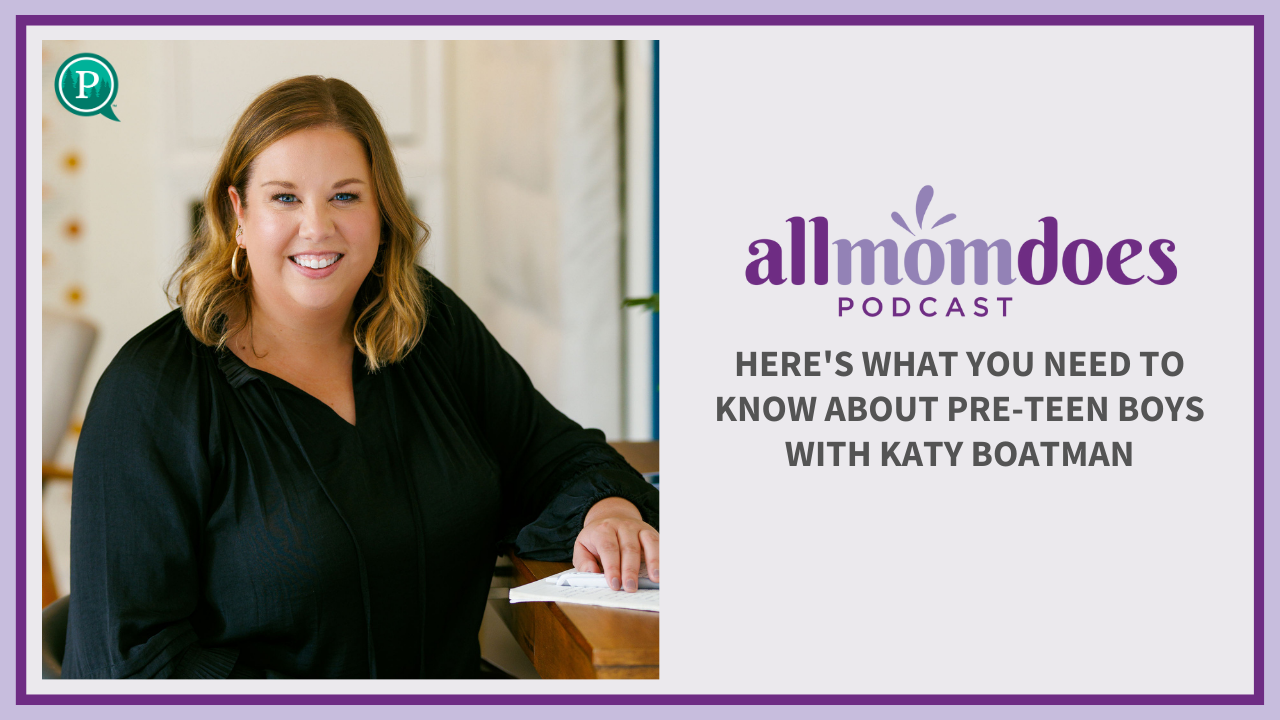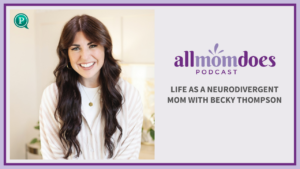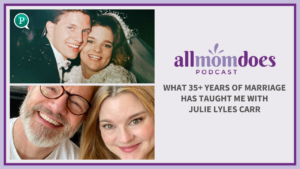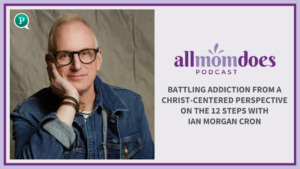Katy Boatman returns to the AllMomDoes podcast with Julie Lyles Carr. She shares what she’s discovered about the top emotional needs of pre-teen boys, a population that’s often overlooked in our parenting perspectives and how we can help untangle what’s underneath the anger and shutting down we’re sometimes faced with with our kids.
Show Notes:
Find Katy: Online | Instagram | Facebook | X
- Devotional: You Can Trust: 100 Devotions to Answer Your What-Ifs (Devotional for Preteen Boys)
- Devotional: You Can Rest: 100 Devotions to Calm Your Heart and Mind
Find Julie: Online | Instagram | Facebook | X | Pinterest
Find AllMomDoes: Online | Instagram | Facebook | X
Transcription:
Katy Boatman:
I just think it’s this place where it’s super important to pour in and really try to help them figure out what is true, what does God’s word say about the way that we live our life? And figure out those answers alongside trusted resources before getting access to everything, which is coming with middle school and high school.
Julie Lyles Carr:
All right, mama, we have got some great tools for you we’re going to be talking about today, particularly if you have a preteen boy. I’m Julie Lyles Carr, this is the AllMomDoes Podcast, where we want to come right alongside you to encourage you in the life you’re living, the kids you’re raising, the marriage that you are nourishing, the career you’re chasing, and of course, your spiritual life. So I’m so glad that you’re here today. We’re part of the Purposely Podcast Network.
We have somebody coming back on who we got to have on a couple of years ago, and in the time that we had that conversation, the work and the focus that she had at that time, it ended up being nominated for awards, for books and all kinds of cool things. I want you to say hi again to my friend Katy Boatman. Katy, thanks so much for being here.
Katy Boatman:
I’m so excited to be back. Thanks for having me back.
Julie Lyles Carr:
Absolutely. Last time you were on, I loved the topic that we got to tackle, which was helping our kids, our teen kids, understand how to rest. And part of what I loved about that Katy, was I think a lot of times, so many of us are trying to think, oh, my teenager’s being kind of lazy, or they’re doing this or I’ve got to motivate them, I’ve got to push them, I’ve got to do these things. And you took a really different look at that in terms of the stress and anxiety levels that a lot of our kids are dealing with. So give the listener a little recap.
I’m going to ask Rebecca to put in the show notes where the listener can go back and hear that full episode. But I would love to hear the journey by which you arrived at wanting to write about the topic of rest, and then we’re going to pivot and we’re going to talk about a new focus, you have a new message that I think is awesome for preteen boys. So take me back to the rest message, its correlation to stress and anxiety in our preteens and teens today.
Katy Boatman:
Yeah, that whole project really started with just something I was working on for my niece. She was 10 at the time and she really was struggling with falling asleep at night because her mind was racing all the time. And as I was thinking about just a special gift for her, I thought she loves to read. She had talked about how reading at night really does help her calm her mind. And so I decided to write just a really short 10-day devotional for her called You Can Rest. And the thought process behind that was not looking at a preteen and saying, hey, you just need to stop what you’re doing because what does that even mean to a kid or even to any of us? But really to have something to refocus her mind on and to read about who God is and be reminded of truth so that she could settle down and that’s really how you can rest, which is a 100 Devotions got started.
I gave her the really short version and then I decided to self-publish it and a publishing friend of mine reached out and wanted to have a conversation about it and wanted to talk about it. And so we decided to expand it and turn it into a hundred-day devotion, which is what came out two years ago and what we got to talk about two years. And so that really was kind of the catalyst for what I’ve been working on the past two years as well because when that came out that really was focused on girls and the number one question I got was, well, where is one of these for boys? So that’s where we are today.
Julie Lyles Carr:
All right. I love that. And I know that the next topic we’re going to talk about was driven out of your love for your nephew. So I think it’s just so beautiful that you’re finding this inspiration in these kids that you’re pouring into your niece and your nephew.
So let me back up a couple steps. Give me a good snapshot of what’s going on with preteen boys today, and you know what’s so interesting about that population, Katy, and that I love, you’re bringing this population up to the forefront. I feel like we spend a lot of time when we talk about raising boys, when we look at, when they’re toddlers and little guys and we’re trying to figure out their energy levels and how they’re different than our girls or if they’re different than our… I mean, all the things, all those conversations, then I feel like the conversation picks back up again as we are getting them into their older teen years.
So how to help make them responsible drivers, how to help them with their dating, how to help them as they are launching into college and understand the kind of men that they want to become. I feel like a preteen boy is sort of an invisible population. It’s like what do we do with these kids? They’re not technically a youth group, but they’re not technically elementary school kids and they’re not… What do we need to know about preteen boys today? What is the landscape for them?
Katy Boatman:
Yeah, you’re so right about that. They’re really in this in-between spot where they’re curious and they’re asking questions and they’re finding out a lot of information, but yet, they’re not quite to the place of having a ton of responsibility and needing to make decisions on their own yet. So it’s really this formational spot because we get a chance to help them figure out, okay, how do I step into this next phase of middle school, high school and learn how to make decisions on my own and learn how to deal with all these what if questions and what do I do about it? And they’re also faced with so much more than we were when we were growing up because the internet is right in front of them and social media, and I know parents and mentors and youth pastors are all trying to help figure out when is it the right time for them to have access to those things because we don’t want them to find out all the information because the internet told them, we would rather teach them ourselves.
And so it really is this interesting spot for a kid in that age range and especially for a boy and especially for the influences that are out there. So I just think it’s this place where it’s super important to pour in and really try to help them figure out what is true, what does God’s word say about the way that we live our life, and figure out those answers alongside trusted resources before getting access to everything, which is coming with middle school and high school.
Julie Lyles Carr:
Right, because they’re going to encounter it. One thing I always tell parents, I have parents say to me, “How do I make sure that my kid never sees X, Y, Z?” And I’m like, “Okay, there’s your problem right there. They’re going to.” So this is all preemptive, the question, the conversation really becomes, what do I need to do to prepare my kid for when all this stuff starts coming at me? I love that you’ve already tapped into that. You’ve already thought through that.
Katy, when I think about… I have five girls and three boys, and when I think about my sons, one of the things that we really wanted to make sure they had was we didn’t want them to feel like they had to be guys who could never cry or who couldn’t explore the arts or who couldn’t tap into their more sensitive sides, their more artistic sides, their curious sides, their whatever that was for them as individuals, we wanted to stay, as best we could, away from some of the tropes that I think a generation of guys thought they had to be.
And I’m really thankful we did that. We have three guys who are all very different in their personalities and they’ve all explored different things and it’s been really cool to watch each of them on their individual paths. I can see though that to some degree, even when we remove some stereotypes that potentially have some danger signals to them, when we remove some stereotypes that maybe can be very limiting or really kind of myopic in the way in which they look at some different things, it also can introduce an arena that there can be some confusion about, well, then who am I supposed to be? If we’re opening up the doors for me to not have to align with something that’s sort of shut down your emotions and be this kind of thing and be a John Wayne, then I think it can open up some, okay, then how do I become the best guy I can be in a world that has so many different definitions, and in faith communities that also want to promote certain avatars that aren’t necessarily biblical or needed.
So how did you think about that as you were beginning to approach writing to a primarily a preteen male audience and their parents helping guide them along the way? How did you align all of that? Because I feel like we’re in such an interesting time of trying to release certain things, but then that can also open up lots of questions about, well, where are we headed then?
Katy Boatman:
Yeah, it’s so complex. You’re right. And I think I just thought about it and looked at it from a perspective of guys have just as many emotions as girls do, they just typically deal with them differently. And so having a preteen boy understand that it is okay to show emotion, it is okay to talk about your feelings, it is okay to dig in and figure out what you’re actually feeling. All of that stuff is okay, and even when we look at the book of Psalms and David and every emotion that he had throughout all of that, there’s nothing that we’re going to bring to God that he’s going to be afraid of and be like, you’re too much. I can’t handle this.
And so I really just tried to stay in that place of being like, it is okay to feel like you’re not strong enough because the truth is we’re not, and it’s okay to cry sometimes. It’s okay to be angry, but what we do with that and how we deal with our emotions is also really important. And so really, I just try to touch on those things because you’re right, it’s complicated and complex right now.
Julie Lyles Carr:
Right, and for these preteen guys to be figuring that all out.
Katy Boatman:
Yeah.
Julie Lyles Carr:
Okay, so let me give a little bit of the punchline on what you’ve done here because I love this. So the one that you wrote intentionally toward girls was You Can Rest. This one, and I really want to dig into this really specific word that’s in this is You Can Trust, so this is very interesting to me. I know that you felt a hidden need in You Can Rest with watching your niece and seeing that she was struggling with letting go of anxiety, and so the solution for her saying, “Hey, you can rest. You can rest in God.” What was it about trust that seemed specific toward the needs of preteen boys, towards your nephew? That word trust, that’s a really interesting felt need that you’ve tapped into.
Katy Boatman:
Yeah, as I really dug into that, it was based on the fact that I know so many boys have a ton of questions and I love their curiosity, but I know those questions a lot of times, are rooted in the fact that they’re worried, they’re fearful, they’re not sure that things are the way they seem to be. And I think this next generation really does have a lot of questions about who they can trust. And I don’t blame them because our world is really confusing and really broken. And so that’s really how I landed on You Can Trust is trying to help them get to this place of understanding that God is who he says he is, and also teaching them throughout the book about his character, really about who he is, and so that can help them figure out all these questions and fear and doubt and all of that that’s coming up in their minds.
Julie Lyles Carr:
I think something too that we are going to be navigating for a long time is we have some people within our faith communities who are great orators, great speakers, great leaders, they have achieved a certain level of status and notability that in our media saturated environments has carried their names a lot further than maybe it would have in the past. And when one of those leaders has a fall, I think particularly for young men who are watching that, that alignment with trying to trust within a faith community and that being connected, a lot of times, to how we see having trust in God, but seeing someone that maybe they aspire to be, maybe someone they really admired.
And that’s not to say that women can’t have the same kind of falls and foibles along the way. I’m not saying that. What I am saying is because there is a very public side to how a lot of our faith communities are run and when there are problems, and a lot of times that tends to be a guy who gets spotlighted in that problem, the message that sends to our kids and to our preteen boys and our teenage boys. So how do we help our kids see the difference between being able to trust God and to also trust our leadership but to hold space for the fact that those leaders are human? Because this is where I see a lot of the conversation falling apart as parents are trying to guide kids into their own faith and their own faith expressions is how difficult it is right now for our kids to be able to trust a church environment, but understanding the difference between trusting a church environment and trusting God. How are you seeing that we can tackle that as we begin to talk about trust?
Katy Boatman:
Yeah, that’s a big one. And I think as parents, mentors, small group leaders, we need to help guide them in that, in showing them that there is a difference between God and a pastor and not putting a pastor on this pedestal that we do, where we expect them to be God, where we expect that they don’t also sin. And I think when I bring it down to my own life, when I think about the girls that I mentor and the kids that I’m around, I try to be really as honest as possible when I’ve messed up, when I need to apologize to them for something because I want to model that confession. I want to model that I’m human. I want to model that we can have reconciliation and forgiveness because I don’t want to get to this place where you put so much spotlight and emphasis on one person or one institution and then it crumbles and you think, well, there goes my faith.
So I mean, my heart goes out to all of it because I see it all the time. I’ve experienced it at my own church and it’s like one fall after the other. But I also look at it and go, well, when’s the point where I realize that of course they’re going to fall because sin is real. And yes, we need to put more accountability in place and have better structure and community. But yeah, I think when it comes to our kids and our teenagers, bringing that reality to them as soon as we can, not the reality of like, hey, look at what this person has done, but just a reality of we’re all human and we’re going to mess up, I think that gives them a better setup for the future. And I know so many parents do a great job at that, even in their own home, and that matters.
Julie Lyles Carr:
It does matter. We chose as parents and sometimes very much in a different way than some of the people in our community were, but if we had a situation come up that was going to need to be addressed in terms of a leader’s decisions and choices, we were actually always very upfront and very honest with our kids. And I know that there can be a wrestling about how much is too much and on and on. I just didn’t want my kids to then feel like they couldn’t trust me, that I wasn’t going to tell them the full totality of the truth and the full explanation. And we have to think about that as people in kids’ lives, you as a beloved aunt, me, I’m also an aunt, I want my nieces and nephews to know that they can trust me at my word. I want my kids to be able to know that. So just the honesty, to just tell the truth about what’s going on, to not try to hedge all kinds of things is really important, I think, as we head into further seasons with our kids.
Now, Katy, one thing that I think is interesting is You Can Rest was dealing with stress and anxiety for girls, You Can Trust, it also comes from this sense of preteen boys feeling stress and anxiety. How do you think that stress and anxiety manifests differently potentially for girls and for boys? How do you think boys maybe show that? And I realize that that’s a pretty… it’s not as cut and dry as that. There can be a lot of crossover, but I do think sometimes, depending on someone’s personality and their experience in life, we may not always pick up on the fact that the behavior that we’re seeing has something to do with stress and anxiety. We might be interpreting it a different way. So what are some markers that you’ve noticed in a preteen boy population that maybe parents might be missing, they may not be able to see it as clearly being stressed or anxiety?
Katy Boatman:
Yeah, the boys so often it can come out as anger, which really surprised me, I think, when I was starting to realize that and learn that, like it can be that snappiness or just irritability. And when you start to really dig in on what’s going on there, you’re like, oh, okay. You’re nervous about something. Yeah, okay, so this whole thing is actually about being nervous. And I know a lot of boys too will just shut down completely, not interested in talking, not interested in pretty much anything.
And I read a book by David Thomas about raising emotionally healthy boys, and he talks so much about just the need for physical activity with these boys that sometimes in those moments where anger’s popping up, they’re shutting down or you can tell there’s something going on, but they don’t want to talk about it at all, getting them moving and active, even if it’s like, let’s go shoot the basketball for a few minutes and just working it out. And sometimes, things start to come out in those conversations while you’re actually doing something instead of just sitting there staring at him across the table expecting him to pour his heart out. I think all of that is so interesting and so true. And yeah, I sat down with a group of my niece’s friends when I wrote the first book, and then I sat down with a group of my nephew’s friends with the second one.
Julie Lyles Carr:
Love that. Love that.
Katy Boatman:
And it was funny to see kind of the difference in what they wanted to share, how much they would share, the seriousness of things, which is so difficult. But I, in general, was grateful that any of them would share anything with me just to help me write this project.
Julie Lyles Carr:
Katy, that’s one of the things I love about your work is you’re not saying this just from a philosophical, stand outside the lab door here’s what you kind of think. You do a lot of research on the front end, and you not only go to those who may be thought leaders or researchers in the area, you actually then bring in the very kids who you’re wanting to talk to, which I think is amazing because there’s so much in parenting and in youth management, if you will, that sometimes is sort of, I don’t know, kind of philosophical and out there without actually asking the very people who are in that season, in that season of life, what they’re dealing with.
And I think a lot about the fact that there are things that are common to my experience as a preteen that I could relate with with my kids. “Oh, yeah, I remember that. I remember how that felt.” But there are things they deal with that we don’t know, we have not been through. And to try to pretend like we are sages and wisdom hackers in situations that we ourselves have not faced is problematic. So the fact that you’re willing to say, “Hey, sit down with me. Help me with this. Let me learn from you,” is so powerful. Thank you so much for doing that. I think that’s amazing.
Katy Boatman:
Yeah, absolutely.
Julie Lyles Carr:
So tell me what you found out in this little focus group that preteen boys say that they are anxious and stressed about, what is it that they are grappling with?
Katy Boatman:
Yeah, it runs the gamut. It was everything from losing a football game to something not being fair to what if somebody breaks into my house at night. It got into some of those bigger things, and I remember some of that as a kid too, thinking the what ifs of house fire, that kind of stuff. So some of those things came up and then it was also day-to-day stuff that happens at school.
And what’s funny is I went into it thinking, oh, I bet the things that they talk about will be so different from what the girls had to say. And honestly, a lot of their worries were really similar. I just think it looks differently in the two that the girls might get really emotional and come tell you about what they’re scared about. The boys, like we were talking about, might get angry or shut down or just don’t want to talk. So their fears are kind of similar.
And we’ve obviously been through such a weird time in the last four years that these kids have grown up in of so much change, and the pandemic brought about every day was different. Are we going to school today? Are we not going to school? Are we doing it at home? Can we wear a mask? Can we not? I don’t know what I’m supposed to do. And then, especially the kids that I talked with here have also experienced this next level of trauma and anxiety. We had a school shooting here in Nashville back in March, and a lot of these kids, they didn’t go to that school, but they’re very connected to it, have a lot of friends that do. So that conversation was very front of mind. I had interviewed the boys before that happened, but just with the book coming out, that conversation has been very front of mind here in our community.
I don’t know, it’s so interesting to me the way the Lord has aligned these projects within this community especially, because it’s not a project that I set out to do. I really just wanted to help my niece. And then it really has become this thing of pouring in and doing what we can to give them a resource that really is helpful to start their day or end their night. Yeah.
Julie Lyles Carr:
Beautiful.
Katy, I am struck afresh with you mentioning it again. It is interesting how quickly a lot of us decided to move on the pandemic, and I do a lot of writing in a lot of different avenues. One of the places that I spend a good chunk of time writing is on business and business patterns and business environments and cultures. I really anticipated, as someone who was writing a lot of content for that arena, that we would probably spend a longer amount of time really analyzing and thinking about the impact of the pandemic and how it was going to change things moving forward. That’s my observation. Not saying this is completely accurate, but I almost feel like it’s one of those things like, yeah, yeah, yeah. Okay, we’re through it. It’s over. It’s done.
And yet I look at a generation of kids, when we talk about preteen kids, if we’re talking about a 10-year-old, an 11-year-old, let’s think about this a minute, over 1/3 of their life, it has been in the gear up to quarantine, in quarantine, are we coming out of quarantine, and then the continued conversation around COVID.
We even had something pop up in my house just a few weeks ago where I realized one of the kids had either allergies or a cold, and of the kids who were still living in the home, there was this immediate almost frantic sense, Katy, of, well, we need to COVID test him. We got to COVID test him. With me going, “Wait. Whoa, whoa, whoa, calm down. We’ve been through this. This is not new.” But it made me aware afresh of the residual anxiety that still is there for my kids who are not preteens anymore, but were preteens right in the thick of COVID.
So what do we need to be aware of? And to your point, when we have things like school shootings, when we’ve got kids who spent over 1/3 of their lives in quarantine and in the COVID days, all of that, it’s so fast sometimes in our culture to move away from that stuff and to not really understand the lasting impression that it makes. How do we, as people who are engaged in youth ministry, as extended family members, as parents, how do we honor those things that really have been big in our kids’ lives without them getting stuck there and without us getting stuck there with them?
I think it’s such a tender balance between showing someone and guiding someone about how to move beyond and to grow while, at the same time, not diminishing the very real fear and anxieties and challenges that they’re feeling. I don’t think we mean to as parents, but so often, I feel like we absolutely are gaslighting our kids, and we’re like, it’s fine. It’s fine. It’s over. You’re done. Dust your knees off. You’re okay. You’re okay. You’re okay. We do it because we love them and we don’t want them to feel bad, but unintentionally, what we’re also doing is showing them your feelings in this don’t matter or can be brushed away. So how do we do a better job really acknowledging the challenges these kids have been through, but not to the point where we’re not providing a guidance and a way through it?
Katy Boatman:
Yeah. Well, I think just like you and I are talking about, even just remembering that it happened is important to start with because you’re right, I think we so quickly want to just move on mentally and be like, I don’t want to talk about that again. That was so hard, and forgetting that it was such a large part of their lives. And so I think we have to step back too and think about those moments where, let’s say, our plans change for the weekend because something happens with the weather and we can’t go anywhere, and so we’re going to have to stay home this weekend. And all of a sudden to a preteen kid, their mind goes back to, well, I remember when all we did was stay home in the house and we couldn’t go anywhere. And they start getting weird and anxious and you’re seeing all these feelings, but you’re not sure why.
So I think having to just remember that that’s what they’ve lived and we have too, but we have so much more experience. We have so many more years to put around that, and they don’t. That’s really all they know. They know a plan changes, which means my mind goes back to COVID, and just giving some sympathy and grace around that because you’re right, I think it’s so easy for us as adults just to say, it’s going to be fine. Don’t worry about it. Why are you freaking out because we had to change plans. We’ll just reschedule. But remembering that that’s bringing up this emotion of like, what’s actually happening here. Am I going to be stuck in the house for a really long time? Is there a bigger thing going on that I don’t know about?
Because I think that was part of the pandemic for kids too, is like, we were trying to figure out what is going to happen. And so they only knew a very small piece of it. And so I think as much as we can give them an insight into here’s the bigger picture, I think that really helps too. Here’s where we’re headed, if we know. Here’s where we’re headed, here’s what we’re going to do, we’re going to reschedule this thing. Or we have bad weather because January and we got snow, and that kind of thing, and just giving them the information that we can, I think is super helpful just to calm their minds in the same way that it would be to us adults.
Julie Lyles Carr:
To honor the emotions and feelings they’re having and to say, that counts and I care, and here’s what I can tell you.
Katy Boatman:
Yeah.
Julie Lyles Carr:
Katy, I just love everything you’ve put together. So this newest one, mom, is You Can Trust, and even if you don’t have a preteen boy, I bet you have somebody in your life who does. It’s 100 devotionals specifically designed for parents and preteen boys to walk through the feelings they’re having and the felt need that they have. Can they trust? Who can they trust? How can they trust God? Such a great way to carry them through that.
Katy, where can my listener get in touch with you? See all the great things you’re doing, connect on social media, all that?
Katy Boatman:
Yeah, I mostly hang out on Instagram. I’m @katyboat. It’s K-A-T-Y-B-O-A-T. And then you also can find out more at katyboatman.com, and the books are available on Amazon or wherever you love to buy books.
Julie Lyles Carr:
Perfect. Well, Katy, I just thank you again for coming on.
Again, mom, I want you to go back, Katy was on in a previous episode. Rebecca’s going to link that for you so you can find that there. And that’s where we talked about You Can Rest. We talked about You Can Trust today.
Katy, thank you so much for making the investment into our preteen kids. I think it’s a population that we often don’t pay as much attention to. So thank you so much for shining a light on these great kids and the things that we want them to experience and the tools that we want them to have in their walks with God. Thanks so much.
Katy Boatman:
Absolutely. Thanks for having me.
Julie Lyles Carr:
Alrighty. You can go to those show notes and you can find Katy on all the places. I would love to connect with you too. I’m Julie Lyles Carr on all the places, mainly Instagram, like Katy was saying about her. Be sure and check out allmomdoes.com. You hear me say it almost every episode, but you need it. It’s a great community of people who are walking through a lot of the same seasons of life you are, who have some of the same questions. You’ll find all kinds of great tips and encouragement there.
I would love it if you would do me a big solid, go to wherever you get your podcast, make sure that you’re subscribed and share the link to this episode to someone in your life who has a preteen boy. Would you do that for me? I would so appreciate it. And be sure and also check out another podcast we have going on called God on the Go. It’s where we help you make the minutes matter, just five minutes once a week with your kids to help inspire you to have some conversations that you’re going to want to have with your kids with a biblical base. So be sure and check out God on the Go. I’ll see you next time here on the AllMomDoes Podcast.
Follow this podcast:







